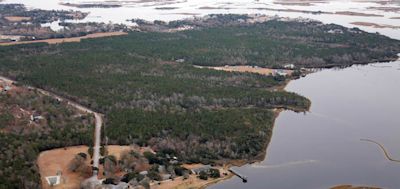Reprinted from the Tideland News of Swansboro
SWANSBORO — The N.C. Court of Appeals has unanimously ruled against the state Board of Education and others who were seeking to transfer 289 mainland acres to the education board, ultimately to become a part of Hammocks Beach State Park.
The state’s plan was for the Division of Parks and Recreation to eventually take over the land, adjacent to Queens Creek in Swansboro, from the education board and manage the property for recreation and education purposes.
Supporter Spotlight
The appeals court’s ruling, issued on Dec. 18, was in favor of Harriett Hurst Turner and John Henry Hurst, plaintiffs in the case. The state could appeal to the N.C. Supreme Court, but the state’s highest court could choose not to take the case. A Supreme Court review would have been required, if the state requested one, had the lower court issued a split decision.
 The 289 acres in dispute border the Intracoastal Waterway, top, and Queens Creek near Swansboro. Photo: Carolina Journal. |
The appeals court ruling is the latest in a six-year legal wrangle over the remaining estate of Dr. William Sharpe, a wealthy neurosurgeon from New York, who fell in love with the marshes of Onslow County during annual hunting and fishing trips in the early 1900s. He bought about 4,600 acres along Queens Creek known as The Hammocks in 1917 and hired his old guide and friend John L. Hurst and Hurst’s wife, Gertrude, to manage and live on the property. Sharpe’s Swansboro estate, which included the nearby barrier island Bear Island, would eventually grow to about 10,000 acres.
The island and surrounding marshes would eventually become a state park, and much of the mainland of Sharpe’s former estate would be developed. The remaining 289 acres was held by the Hammocks Beach Corp. For a detailed history of the land and the lawsuits that bring us here, see Coastal Review Online’s “Trouble in ‘Peninsular Wonderland.’”
The N.C. Board of Education, after a lengthy jury trial that ended in January 2011, was formally appointed the successor trustee to administer the trust. The Hursts, who are the grandchildren of John and Gertrude, appealed that decision to the N.C. Court of Appeals, which ruled that the trial court erred by appointing the education board as successor trustee of the Hammocks Beach property.
Charles Francis, the Raleigh-based attorney for the Hursts, did not comment on the case last week.
Supporter Spotlight
David Pearson of Swansboro, president of Friends of the Hammocks and Bear Island, said Sunday he was disappointed, but added that the effort to secure the land for the park is far from over.
“FHBI will be asking the N.C. Attorney General to pursue an appeal to the Supreme Court,” Pearson said. “We recognize the Supreme Court does not have to hear this case, but we feel in the interest of the citizens of the state it is the responsibility of the attorney general to do so.
“It will remain FHBI’s position that the Hammocks Property be utilized for recreation and education as intended by Dr. William Sharpe,” Pearson added. “FHBI feels the N.C. Department of Parks and Recreation is uniquely qualified to fulfill this responsibility, and intends to pursue all avenues available to the citizens of North Carolina to accomplish this goal.”
Pearson, who went to Raleigh to discuss the issue Friday with others involved in the long legal battle, said the appeals court ruling does not mean the property now belongs to the Hursts. Whether the state Supreme Court takes the case or not, he said, ultimate ownership of the property would still need to be decided by the trial court.
 John Hurst |
 Judge Carl Fox |
The bottom line, he said, is that it will be, at a minimum, months before that decision comes. And he stressed that there are a number of options his group could still pursue, both before and after a final court decision.
The modern history of the land goes back to the early 1900s, when Dr. Sharpe, a New Yorker, purchased 4,600 acres and hired John L. Hurst, son of a slave, to manage it.
Sharpe initially planned to give the property to the Hurst family when he died, but the family eventually convinced Sharpe to donate it to a black teachers’ association.
The teachers association in the 1950s established the Hammocks Beach Corp. to manage the property in trust for its members. The property deed stated that if the corporation couldn’t manage the property properly, it could transfer the deed to the state board of education, but that if the board turned it down, it would go to the Hurst and Sharpe families.
The legal wrangling began in the mid-1980s, and has continued to this day. In 2006, the Hurst heirs sued the corporation, claiming that it had failed to properly administer the trust, and sought the return of the 289 acres to the family.
In October 2010, Judge Carl Fox of Wake County Superior Court removed the corporation as trustee. In early January 2011, Fox asked the state education board if it wanted the land.
Although the board had previously rejected the trusteeship, it then said it would accept it, a move that could have cleared the way for the land to become part of the state park.
However, a subsequent ruling by the appeals court on a petition filed by Harriet Hurst Turner and John H. Hurst, heirs of John L. Hurst, placed a temporary stay the Superior Court ruling.
And the appeals court ruling did indeed cite the education board’s previous decisions to decline trusteeship.
“Plaintiffs (Hursts) first argue that the trial court erred in appointing the SBE as trustee where the SBE had made judicial admissions disclaiming any interest in the Trust and admitting that it ‘may not serve as successor trustee.’ We agree,” Judge Wanda Bryant wrote for the court trio, which also included Chief Judge John Martin and Judge Douglas McCullough.
“This Court has found that a judicial admission is a formal concession which is made by a party in the course of litigation for the purpose of withdrawing a particular fact from the realm of dispute. Such an admission is not evidence, but it, instead, serves to remove the admitted fact from the trial by formally conceding its existence.”







